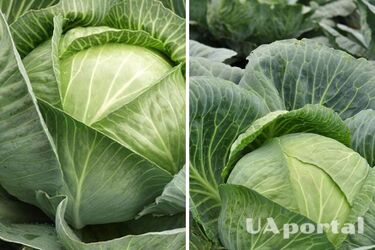Cabbage heads do not set: what is the reason and how to increase yield

Cabbage is a capricious vegetable. In addition to pests and diseases, it happens that it does not set a head of cabbage. UaPortal will tell you how to deal with this and what the reason is.
When cabbage forms a head of cabbage
First, let's figure out in which month the cabbage forms a head of cabbage. It depends on the variety: early varieties form heads of cabbage in July, late varieties in the second half of summer and early fall. In general, cabbage forms a head of cabbage about 2 months after sowing. Leaves are the first to appear. Then, when there are 10-20 of them on the cabbage, a head of the cabbage is formed.
Why don't heads of cabbage set? There are several reasons.
Poor seed quality or unsuitable conditions
If the seeds you purchased were of poor quality or not suitable for the climate, the heads of cabbage may not form properly.
Not enough light
Cabbage needs a sufficient amount of sunlight. If it grows in the shade, it can stretch upward instead of forming a head of cabbage.
Acidic soil
Cabbage needs neutral soil. If the soil is acidic, it should be deoxidized, for example, by adding ash or dolomite flour.
Incorrect location
If cabbage is planted in a place where cabbage or its "relatives" (cruciferous) already grew last year, the yield may be small. It is also not recommended to plant cabbage after pumpkin, but after onions, legumes or nightshades, it usually grows well.
Extreme temperature
In hot or cold weather, cabbage can stop forming heads of cabbage. The optimal temperature for the growth of this vegetable is 17-20°C.
Insufficient watering
Large cabbage leaves evaporate a lot of moisture, so cabbage needs to be watered regularly, especially in the heat. After watering, the soil should absorb moisture to a depth of about 30 cm. After watering, it is also recommended to loosen the soil to avoid crusting. Mulching can also be used to retain moisture in the soil and reduce the need for frequent watering.
Read also: Three delicious kale recipes you'll want to cook all the time
In addition to optimal temperature, light, and watering, cabbage needs fertilizer to form heads of cabbage. Here are some recipes you can use:
Yeast and jam
Ingredients:
Yeast - 100 g;
Jam - 0.5 liters;
Water - 10 liters.
Mix all the ingredients and leave them to ferment for a while. Then dilute 1 cup of the finished mixture in another bucket of water (10 liters). Pour the solution 1 liter under the bushes. Before that, it is recommended to water the bed well with plain water. This feeding can be done only once every 3 weeks.
Manure and ash
Ingredients:
Fresh manure - 0.5 liters
Ash - 40 g;
Water - 10 liters.
Mix the ingredients and leave to stand for several days. Water at the rate of 1 cup under the bush after watering the bed well beforehand.
Let us remind you when to plant cab bage in the ground.
If you want to get the latest news about the war and events in Ukraine, subscribe to our Telegram channel!
